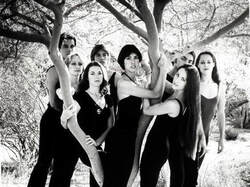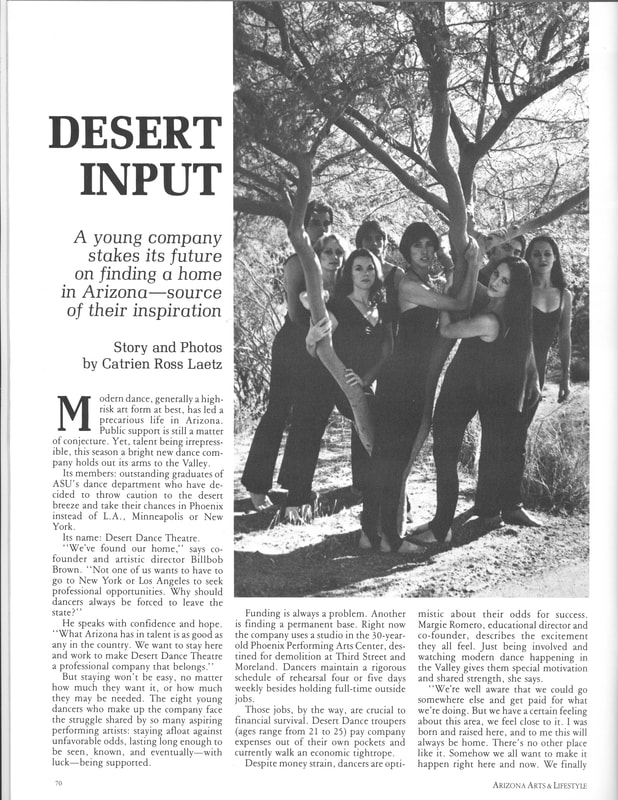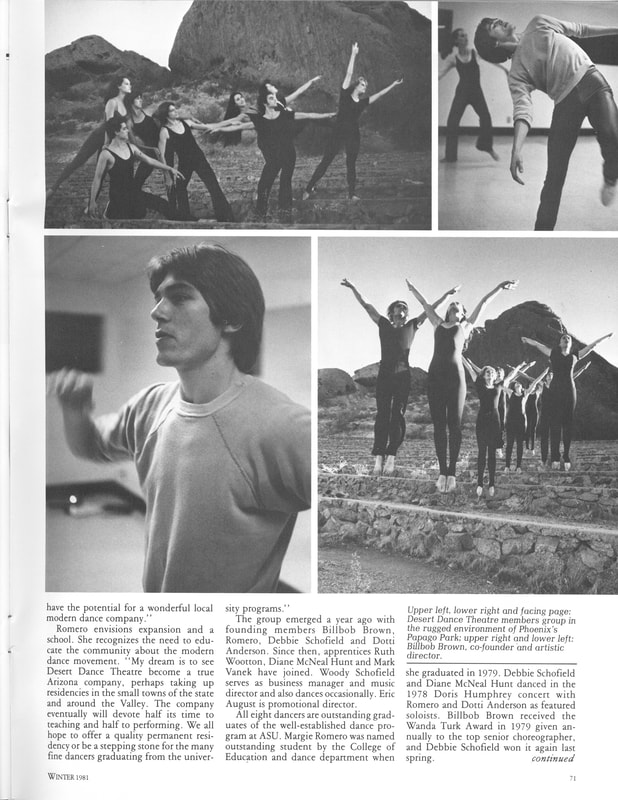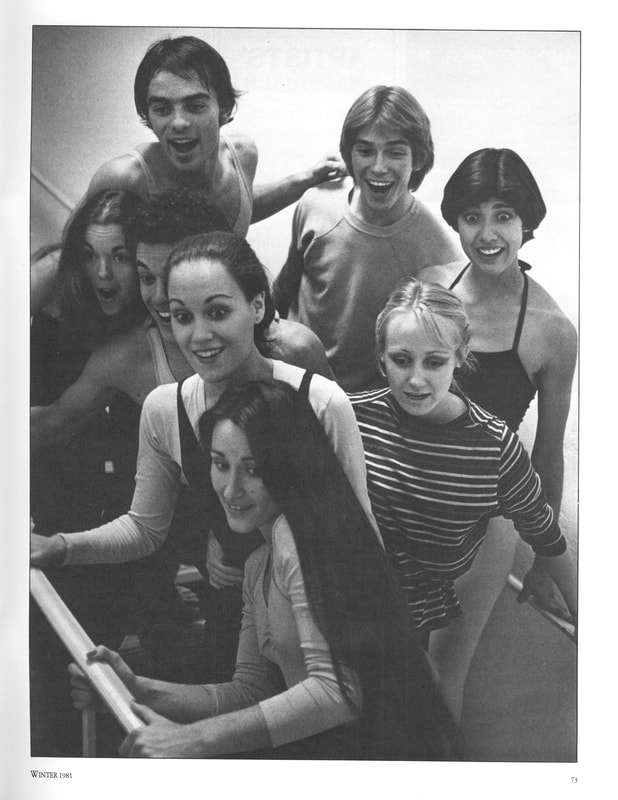Desert Dance History

HOW IT ALL BEGAN
It’s amazing to think that this Arizona dance company has survived in the desert for 40 years. Desert Dance Theatre was founded by four ASU dance graduates: Billbob Brown, Dotti Anderson, Margie Romero, and Debbie Schofield, who wanted to dance professionally, but didn’t want to move out of state to New York or California where dance was already a vital part of the arts, cultural and entertainment scene.
During that time in 1979, there were no professional modern dance companies in the Valley. The only professional dance company was the Mesa Civic Ballet and a couple of small non-professional dance groups that performed on occasion. Those companies don’t exist anymore.
The four ASU dance graduates created Desert Dance Theatre, focused on education and entertainment through their work. This served as an outlet for dancers to perform professionally and to fill a void in the artistic and cultural needs in communities throughout Arizona.
After getting incorporated and obtaining its 501(c)(3) nonprofit status, the company joined the artist roster of the Arizona Commission on the Arts, which gave them opportunities to tour all over the state of Arizona and tour throughout Mexico on the Bicultural Touring Program.
Desert Dance Theatre soon gained a reputation for creating meaningful works which both challenged and delighted audiences with its topical messages, from its first performance of Judgments, an evening-length work about racism, to its collaborations with the internationally-renowned group Special EFX, the Phoenix Symphony, String Sounds, Musica Dolce, Childsplay, and other groups, connecting children and adults with a wider world of professional-quality dance performance. Sister Moses: The Story of Harriet Tubman, continues to be performed while educating its audiences about American History through dance, music and drama.
The founding members and earlier generations of dancers received much encouragement and inspiration from the late Marion Kirk Jones, an ASU dance professor, who mentored hundreds of dance students and acted as a consulting director for Desert Dance Theatre since its beginning in 1979. Marion had contributed as a choreographer, artistic director and administrator on its board of directors. Her previous dance experiences included: dancer in the Lester Horton Dance Company, trained with modern dance pioneers – Martha Graham, Doris Humphrey, Hanya Holm, Ted Shawn and Louis Horst; and trained at the School of American Ballet with George Balanchine, Anatol Oboukhoff, Pierre Vladimiroff and Muriel Stuart.
Billbob Brown was the Artistic Director of Desert Dance Theatre for the first 10 years. Then Marion Jones served as the Artistic Director with Lisa R. Chow as the Assistant Artistic Director/Company Manager and Renee Davis as the Rehearsal Director/Costumer. A few years later, Lisa R. Chow assumed the role as Artistic Director and continues to do so with Renee Davis and Step Raptis as Associate Artistic Directors. Chow and Raptis created other opportunities for dancers and musicians through various interdisciplinary outlets, such as Crossroads Performance Group and Step’s Junk Funk.
It’s amazing to think that this Arizona dance company has survived in the desert for 40 years. Desert Dance Theatre was founded by four ASU dance graduates: Billbob Brown, Dotti Anderson, Margie Romero, and Debbie Schofield, who wanted to dance professionally, but didn’t want to move out of state to New York or California where dance was already a vital part of the arts, cultural and entertainment scene.
During that time in 1979, there were no professional modern dance companies in the Valley. The only professional dance company was the Mesa Civic Ballet and a couple of small non-professional dance groups that performed on occasion. Those companies don’t exist anymore.
The four ASU dance graduates created Desert Dance Theatre, focused on education and entertainment through their work. This served as an outlet for dancers to perform professionally and to fill a void in the artistic and cultural needs in communities throughout Arizona.
After getting incorporated and obtaining its 501(c)(3) nonprofit status, the company joined the artist roster of the Arizona Commission on the Arts, which gave them opportunities to tour all over the state of Arizona and tour throughout Mexico on the Bicultural Touring Program.
Desert Dance Theatre soon gained a reputation for creating meaningful works which both challenged and delighted audiences with its topical messages, from its first performance of Judgments, an evening-length work about racism, to its collaborations with the internationally-renowned group Special EFX, the Phoenix Symphony, String Sounds, Musica Dolce, Childsplay, and other groups, connecting children and adults with a wider world of professional-quality dance performance. Sister Moses: The Story of Harriet Tubman, continues to be performed while educating its audiences about American History through dance, music and drama.
The founding members and earlier generations of dancers received much encouragement and inspiration from the late Marion Kirk Jones, an ASU dance professor, who mentored hundreds of dance students and acted as a consulting director for Desert Dance Theatre since its beginning in 1979. Marion had contributed as a choreographer, artistic director and administrator on its board of directors. Her previous dance experiences included: dancer in the Lester Horton Dance Company, trained with modern dance pioneers – Martha Graham, Doris Humphrey, Hanya Holm, Ted Shawn and Louis Horst; and trained at the School of American Ballet with George Balanchine, Anatol Oboukhoff, Pierre Vladimiroff and Muriel Stuart.
Billbob Brown was the Artistic Director of Desert Dance Theatre for the first 10 years. Then Marion Jones served as the Artistic Director with Lisa R. Chow as the Assistant Artistic Director/Company Manager and Renee Davis as the Rehearsal Director/Costumer. A few years later, Lisa R. Chow assumed the role as Artistic Director and continues to do so with Renee Davis and Step Raptis as Associate Artistic Directors. Chow and Raptis created other opportunities for dancers and musicians through various interdisciplinary outlets, such as Crossroads Performance Group and Step’s Junk Funk.




